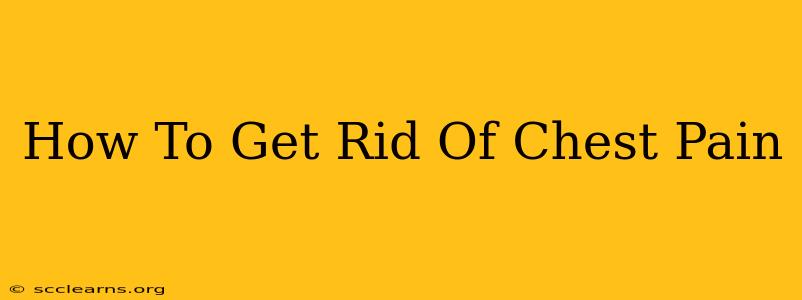Chest pain can be a frightening experience, prompting immediate concern. While some chest pain is minor and resolves quickly, other instances require immediate medical attention. This guide explores various causes of chest pain and offers advice on when to seek professional help and how to manage less severe discomfort. It is crucial to remember that this information is for general knowledge and does not replace professional medical advice. Always consult a doctor for any persistent or concerning chest pain.
Understanding the Causes of Chest Pain
Chest pain's origins are diverse, ranging from relatively benign to life-threatening conditions. Identifying the cause is the first step in effective management. Some common causes include:
Musculoskeletal Issues:
- Muscle Strain: Overexertion, poor posture, or injury can cause chest muscle pain, often felt as tightness or soreness. This type of pain is usually localized and worsens with movement.
- Costochondritis: Inflammation of the cartilage connecting the ribs to the breastbone can cause sharp, localized pain. Deep breaths or movement often exacerbate this pain.
- Rib Fractures: A fractured rib, usually resulting from trauma, presents as sharp, localized pain, worsened by breathing or movement.
Gastrointestinal Problems:
- Heartburn/Acid Reflux (GERD): This common condition causes burning chest pain, often radiating to the throat or back. It's frequently worsened by lying down or eating certain foods.
- Esophageal Spasms: Sudden, intense chest pain mimicking a heart attack can be caused by spasms in the esophageal muscles. This pain is typically brief but can be excruciating.
- Hiatal Hernia: A protrusion of the stomach through the diaphragm can cause chest pain, often accompanied by heartburn or indigestion.
Cardiovascular Issues:
- Angina: Chest pain or pressure caused by reduced blood flow to the heart muscle. This pain is often described as tightness, squeezing, or pressure and can radiate to the jaw, arm, or back. Seek immediate medical attention if you experience angina.
- Heart Attack (Myocardial Infarction): A life-threatening condition caused by a blockage of blood flow to the heart. Symptoms include crushing chest pain, shortness of breath, sweating, and nausea. Call emergency services immediately if you suspect a heart attack.
- Pericarditis: Inflammation of the sac surrounding the heart, causing sharp, stabbing chest pain that worsens with deep breaths or lying down.
Other Potential Causes:
- Panic Attacks: These can trigger chest pain or pressure, often accompanied by rapid heartbeat, shortness of breath, and dizziness.
- Pneumonia: Lung infection can cause chest pain, along with cough, fever, and shortness of breath.
- Pleurisy: Inflammation of the lining of the lungs, resulting in sharp, stabbing chest pain worsened by breathing.
- Shingles: A viral infection causing a painful rash, sometimes with chest pain.
When to Seek Immediate Medical Attention
Do not hesitate to call emergency services (911 in the US) or seek immediate medical attention if you experience:
- Severe, crushing chest pain
- Chest pain radiating to the jaw, arm, or back
- Shortness of breath
- Sweating
- Nausea or vomiting
- Lightheadedness or dizziness
- Sudden onset of severe chest pain
Home Remedies for Mild Chest Pain (Consult a doctor before trying any home remedies)
For mild, non-serious chest pain, some home remedies may offer temporary relief. However, these should only be used after ruling out serious conditions with a medical professional.
- Rest: Avoid strenuous activity.
- Heat or Cold Packs: Applying a warm or cold compress to the chest might ease muscle pain.
- Over-the-Counter Pain Relievers: Ibuprofen or acetaminophen can help manage mild pain. Follow dosage instructions carefully.
- Proper Posture: Maintaining good posture can help alleviate musculoskeletal pain.
- Stress Reduction Techniques: Relaxation techniques like deep breathing or meditation can help manage stress-related chest pain.
Preventing Chest Pain
While not all chest pain is preventable, adopting a healthy lifestyle can significantly reduce your risk of developing certain conditions:
- Maintain a Healthy Diet: A balanced diet low in saturated fats and cholesterol is crucial for cardiovascular health.
- Regular Exercise: Regular physical activity strengthens the heart and improves overall health.
- Manage Stress: Chronic stress can contribute to chest pain; manage stress through relaxation techniques.
- Quit Smoking: Smoking is a major risk factor for heart disease.
- Maintain a Healthy Weight: Obesity increases the risk of several conditions that can cause chest pain.
Disclaimer: This information is intended for general knowledge and does not constitute medical advice. Always consult a healthcare professional for any concerns regarding your health or chest pain. Self-treating can be dangerous. Early diagnosis and treatment are crucial for managing chest pain effectively and preventing serious complications.

